Module 6 Unit 2 If you tell him the truth now, you will show that you are honest.课件(共33张PPT) 外研(新标准)
文档属性
| 名称 | Module 6 Unit 2 If you tell him the truth now, you will show that you are honest.课件(共33张PPT) 外研(新标准) | 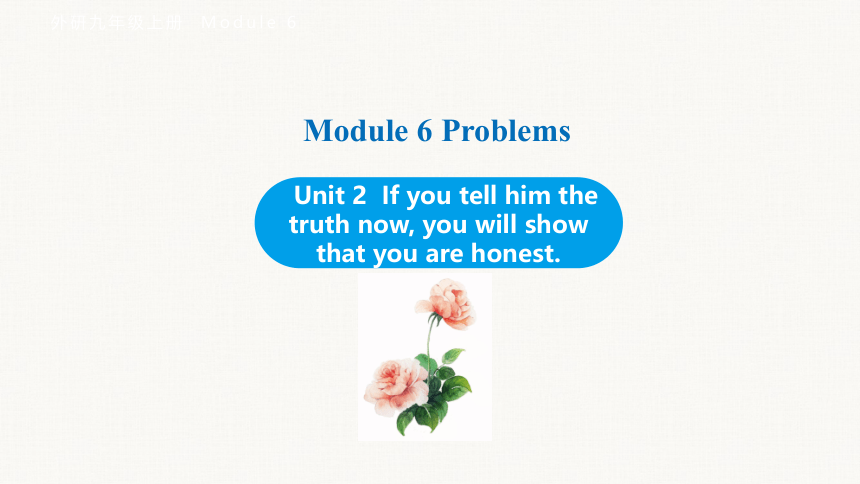 | |
| 格式 | pptx | ||
| 文件大小 | 5.6MB | ||
| 资源类型 | 教案 | ||
| 版本资源 | 外研版 | ||
| 科目 | 英语 | ||
| 更新时间 | 2024-05-14 14:19:43 | ||
图片预览

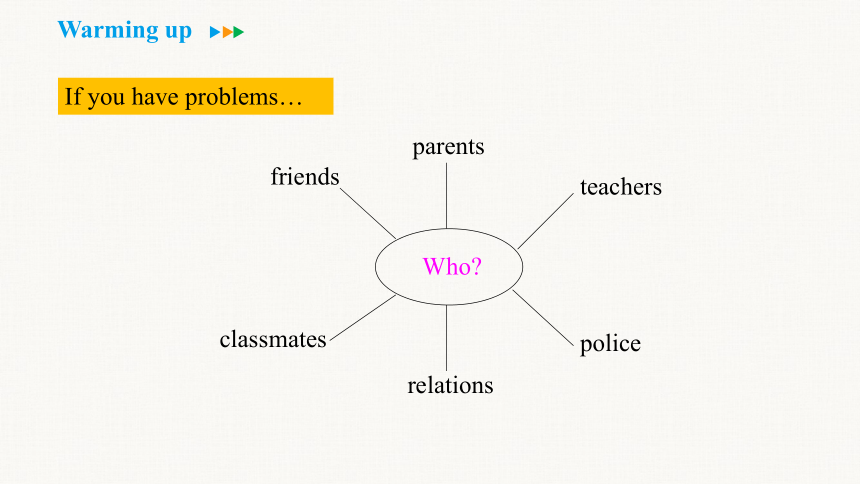
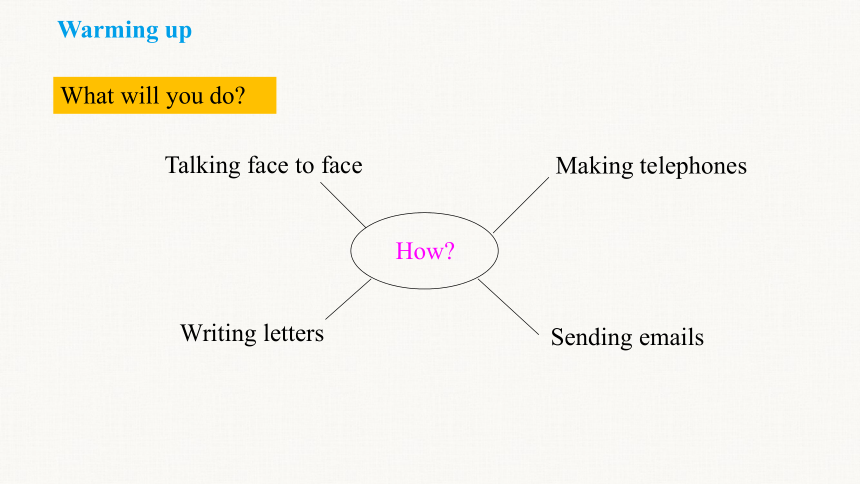
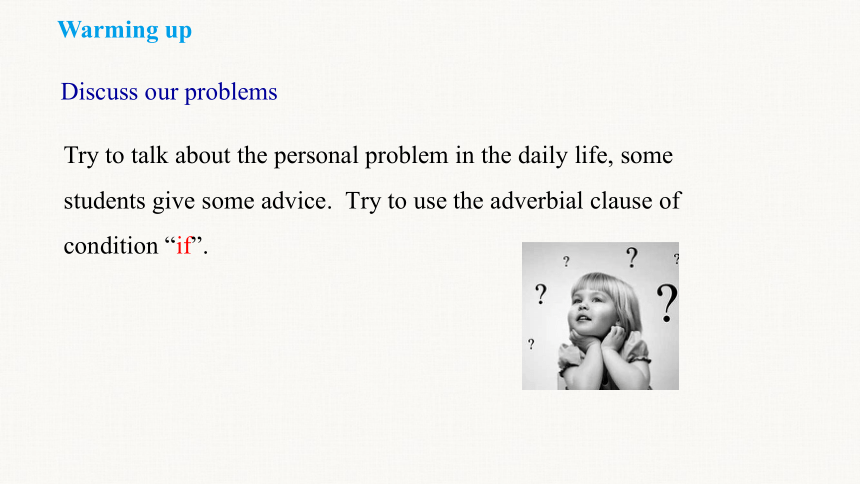
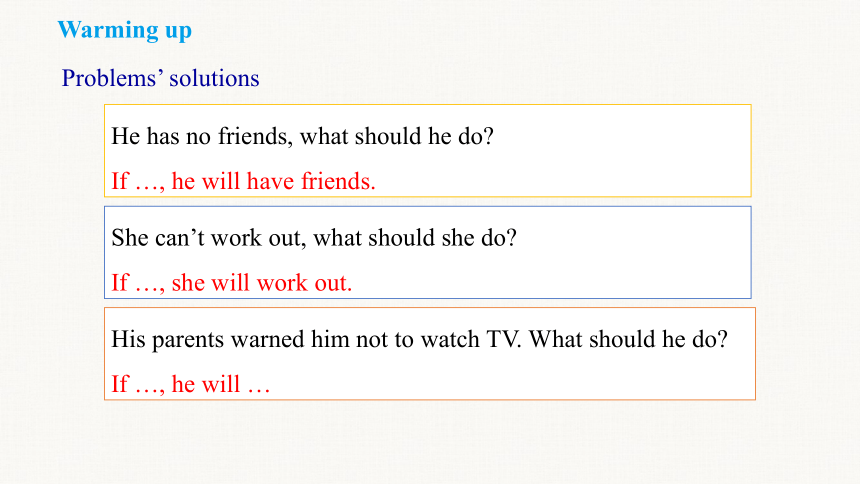
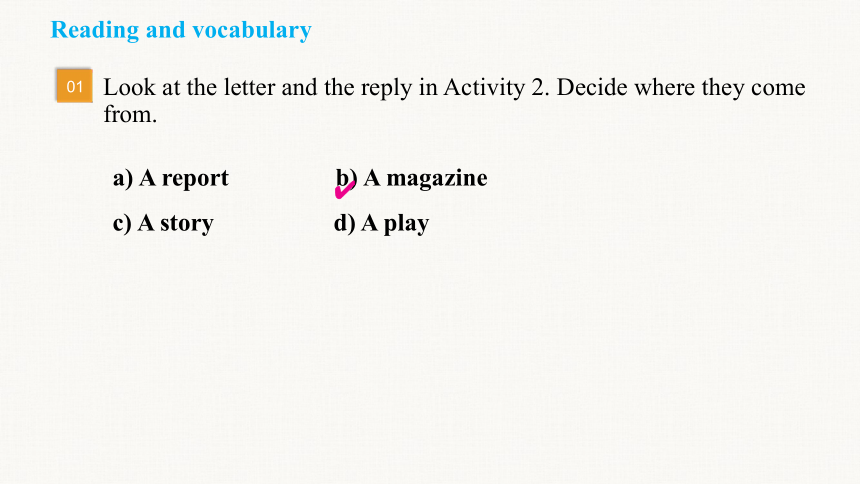
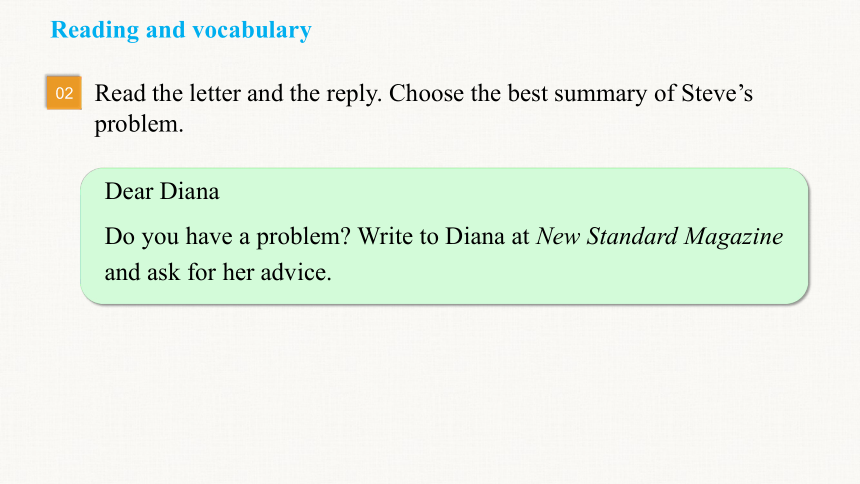
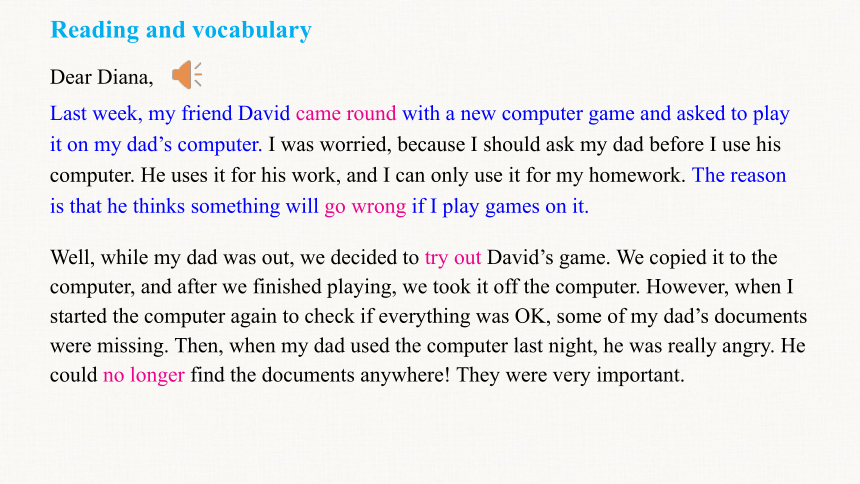
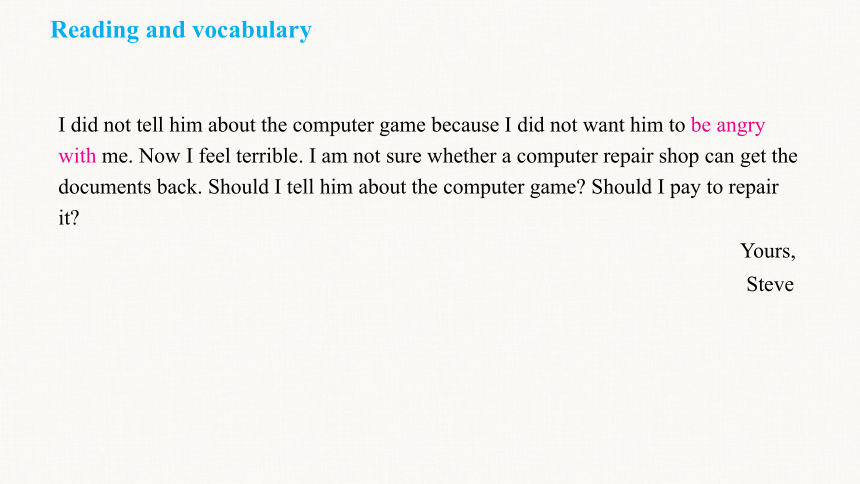
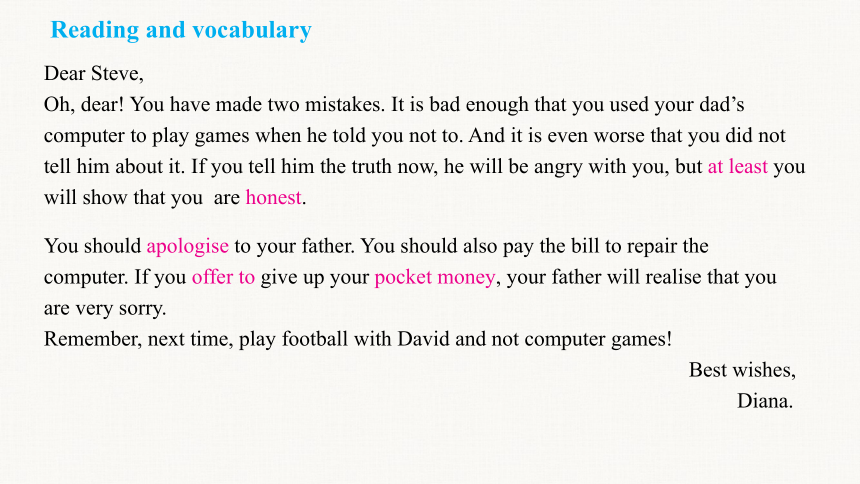
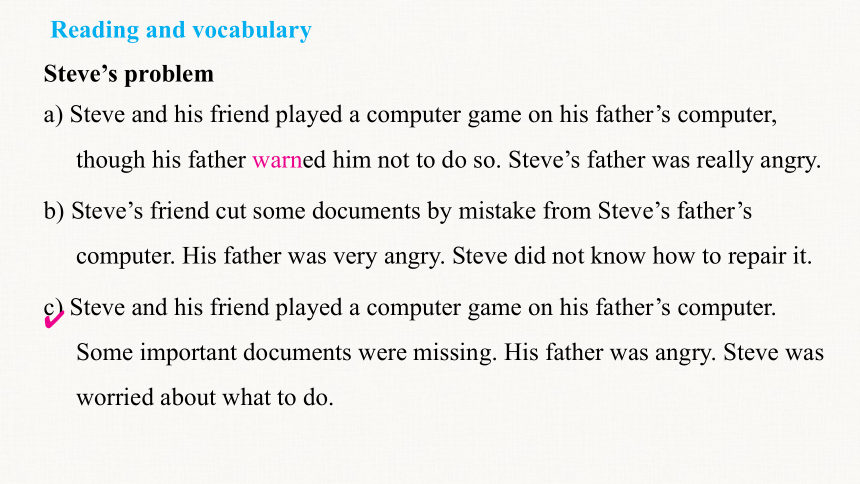
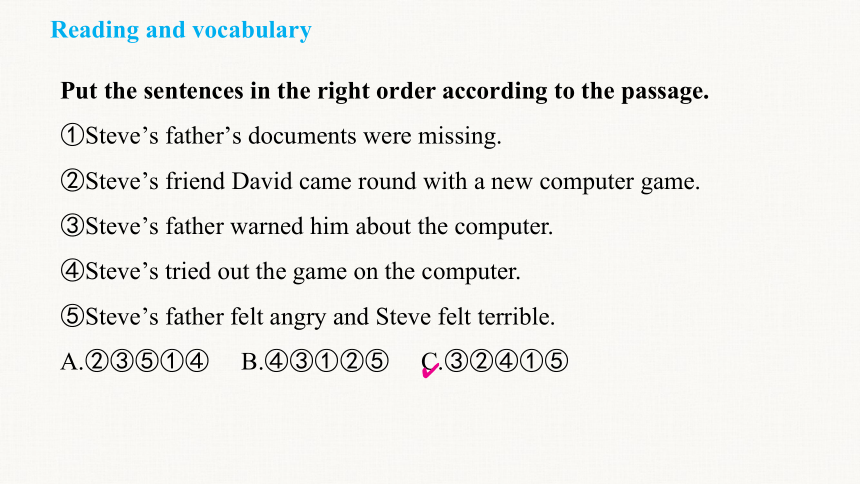
文档简介
(共33张PPT)
Module 6 Problems
外研九年级上册 Module 6
Unit 2 If you tell him the truth now, you will show that you are honest.
If you have problems…
Who
friends
parents
classmates
teachers
police
relations
Warming up
What will you do
How
Talking face to face
Writing letters
Making telephones
Sending emails
Warming up
Try to talk about the personal problem in the daily life, some students give some advice. Try to use the adverbial clause of condition “if”.
Discuss our problems
Warming up
He has no friends, what should he do
If …, he will have friends.
She can’t work out, what should she do
If …, she will work out.
His parents warned him not to watch TV. What should he do
If …, he will …
Problems’ solutions
Warming up
Look at the letter and the reply in Activity 2. Decide where they come from.
a) A report b) A magazine
c) A story d) A play
Reading and vocabulary
01
Read the letter and the reply. Choose the best summary of Steve’s problem.
Dear Diana
Do you have a problem Write to Diana at New Standard Magazine and ask for her advice.
02
Reading and vocabulary
Well, while my dad was out, we decided to try out David’s game. We copied it to the computer, and after we finished playing, we took it off the computer. However, when I started the computer again to check if everything was OK, some of my dad’s documents were missing. Then, when my dad used the computer last night, he was really angry. He could no longer find the documents anywhere! They were very important.
Dear Diana,
Last week, my friend David came round with a new computer game and asked to play it on my dad’s computer. I was worried, because I should ask my dad before I use his computer. He uses it for his work, and I can only use it for my homework. The reason is that he thinks something will go wrong if I play games on it.
Reading and vocabulary
I did not tell him about the computer game because I did not want him to be angry with me. Now I feel terrible. I am not sure whether a computer repair shop can get the documents back. Should I tell him about the computer game Should I pay to repair it
Yours,
Steve
Reading and vocabulary
Dear Steve,
Oh, dear! You have made two mistakes. It is bad enough that you used your dad’s computer to play games when he told you not to. And it is even worse that you did not tell him about it. If you tell him the truth now, he will be angry with you, but at least you will show that you are honest.
You should apologise to your father. You should also pay the bill to repair the computer. If you offer to give up your pocket money, your father will realise that you are very sorry.
Remember, next time, play football with David and not computer games!
Best wishes,
Diana.
Reading and vocabulary
a) Steve and his friend played a computer game on his father’s computer, though his father warned him not to do so. Steve’s father was really angry.
b) Steve’s friend cut some documents by mistake from Steve’s father’s computer. His father was very angry. Steve did not know how to repair it.
c) Steve and his friend played a computer game on his father’s computer. Some important documents were missing. His father was angry. Steve was worried about what to do.
Steve’s problem
Reading and vocabulary
Put the sentences in the right order according to the passage.
①Steve’s father’s documents were missing.
②Steve’s friend David came round with a new computer game.
③Steve’s father warned him about the computer.
④Steve’s tried out the game on the computer.
⑤Steve’s father felt angry and Steve felt terrible.
A.②③⑤①④ B.④③①②⑤ C.③②④①⑤
Reading and vocabulary
Complete the advice to Steve.
1 Steve should never ________________________
__________ when his father told him not to do so.
2 Steve should tell his father the truth now to show
_____________________.
3 Steve should _________ to his father and pay
___________________________.
4 Steve should give up his _____________ so that his
father will realise that __________________.
used his dad’s computer to
that he is honest
apologise
the bill to repair the computer
pocket money
he is very sorry
play games
Reading and vocabulary
03
Complete the passage with the words in the box.
bill honest least reason repair truth
If Steve tells his father the (1) _____, at (2) _____ he will show that he is (3) ______. If Steve wants to get his father’s documents back, he will have to ask a computer (4) ______ shop for help. Steve should use his pocket money to pay the (5) _____. The (6) _______ for this is that it will show he is sorry.
truth
least
honest
repair
bill
reason
04
Reading and vocabulary
1. Last week, my friend David came round with a new computer game and asked to play it on my dad’s computer.
上周,我的朋友戴维带了一款新的电脑游戏来我家,想在我爸爸的电脑上玩。
Language points
come round 拜访(某人的家)
他通常周末来拜访。
He usually comes round at the weekend.
下周什么时候一定到家里来看看我们。
Do come round and see us sometime next week.
表示“拜访”的常用短语:
drop in on + 人
drop into +地点
drop by/in/round(其后不接宾语)
“拜访”某
人/某地
pay a visit to + 地点/人
Language points
2. reason,cause与excuse的用法:
①reason用作名词,意为“原因,理由”,是说明一种看法或行为的原因或理由,后接介词for。如:
There are many reasons for animals dying out. 动物的绝种有许多原因。
You must tell him the reason why you won’t accept his offer.
你必须告诉他你为何拒绝他的提议。
Language points
②cause用作名词,意为“起因,原因”,是造成一种事实或现象的起因或原因,后接介词of。如:
The cause of the fire was carelessness. 失火的原因是粗心大意。
Heat is the cause of the expansion of matter. 热是物体膨胀的原因。
Language points
③excuse用作名词,意为“托辞,借口”,指为免受指责和推卸责任而找的托辞或借口。
如:Too much work is no excuse for absence. 工作太忙不能成为缺席的理由。
I haven’t done the work well, my excuse is that I have been ill.
我没把工作做好,我的理由是我病了。
Language points
3. no longer与no more的用法:
①no longer意为“不再”,通常放在行为动词前,be动词的后面,相当于not...any longer,指时间上不再延续,常与持续性动词如live, work, wait,和be动词等连用,但两者在句中的位置不同。如:
I could wait for him no longer. = I could not wait for him any longer. 我不能再等他了。
The house no longer belonged to him.
=The house didn’t belong to him any longer. 这个房子不再属于他。
Language points
②no more意为“不再”,相当于not...any more,常放动词前,指做某事的数量、程度上不再增加,常与非延续性动词。如:
There is no more bread. = There isn’t bread any more.
没有面包了。
The baby no more cried. = The baby didn’t cry any more.
这个婴儿不再哭了。
Language points
4. repair,mend与fix的用法:
①repair常指损失重大或构造较复杂的事物,如房屋,汽车,桥梁的修理。也可指一般的简单修理。如:
Mary repaired the radio just for the fun of it.
玛丽修理收音机只是为了消遣。
I am going to have my bike repaired tomorrow.
我打算明天找人把自行车修理一下。
Language points
②mend着重指修补小至日常用具,大到较复杂的物体。很多时候可与repair互换。如:
Can you mend a broken dish
你能修理破碟子吗?
She is mending her shoes.
她正在修理她的鞋子。
③fix则侧重于“安装”,有时也用作“修理”。如:
The workers are fixing the machine.
工人们在安装机器。
Have you had your watch fixed
你已找人修你的表了吗?
Language points
Look at the letter by Steve in Activity 2. Find:
1 sentences that say what Steve did and when
2 sentences that say what happened next
3 sentences that say what the problem is
4 Steve’s questions
Writing
05
1 sentences that say what Steve did and when
In Paragraphs 1 and 2:
Last week, my friend David came round with a new computer game and asked to play it on my dad’s computer. Well, while my dad was out, we
decided to try out David’s game. We copied it to the computer, and after we finished playing, we took it off the computer.
2 sentences that say what happened next
In Paragraph 2:
However, when I started the computer again to check if everything was OK, some of my dad’s documents were missing.
Writing
3 sentences that say what the problem is
In Paragraphs 2 and 3:
Then, when my dad used the computer last night. He could no longer find the documents anywhere! They were very important. I did not tell him about the computer game because I did not want him to be angry with me.
4 Steve’s questions
In Paragraph 3:
Should I tell him about the computer game Should I pay to repair it
Writing
Think of a problem. Write a short letter to Diana about the problem. Use the steps in Activity 5 to help you.
06
Writing
Dear Diana,
Last week, we had a history exam at school but I didn’t study for it. I was really worried, because if I failed the exam, my parents would get angry with me. In the exam, I was sitting very near Tom and I realised I could see his answers. So I copied them. I knew it was wrong to cheat, but I didn’t want to fail the exam.
Yesterday, when our teacher gave us our results, she gave Tom a poor mark because she thought he had copied from me.
I’m worried that if I tell our teacher the truth, she won’t let me pass the exam, and my parents will be very angry. What should I do Should I tell my parents first Should I tell the teacher
Yours,
Dave
Writing
Work in pairs. Read each other’s problem letter. Suppose you are Diana and write a reply. Give your advice.
07
Writing
Dear Dave,
I’m afraid you’ve done something rather serious. Cheating is very bad by itself, but in this case it is worse because by cheating you caused Tom to fail his exam. I understand that you are afraid of making your parents angry, but you must remember that Tom has parents too!
I advise you to tell your teacher immediately, and tell your parents afterwards. You should also apologise sincerely and promise not to cheat ever again. You cannot avoid punishment, but you can try to regain the trust of your parents, your teacher and your classmates. I know this advice is difficult to accept, but you must be strong and do the right thing. You will feel much better in the long run.
Yours,
Diana
Writing
1. We have learnt an article about how to infer and summarise problems.
2. We learnt some new words and expressions.
Summary
Homework
1. Finish the task in KESHI A JIHUA.
2. Make sentences with the useful expressions: come round, try out, no longer, be angry with sb., at least, pocket money...
Thanks
Class is over! Bye!
外研九年级上册 Module 6
Module 6 Problems
外研九年级上册 Module 6
Unit 2 If you tell him the truth now, you will show that you are honest.
If you have problems…
Who
friends
parents
classmates
teachers
police
relations
Warming up
What will you do
How
Talking face to face
Writing letters
Making telephones
Sending emails
Warming up
Try to talk about the personal problem in the daily life, some students give some advice. Try to use the adverbial clause of condition “if”.
Discuss our problems
Warming up
He has no friends, what should he do
If …, he will have friends.
She can’t work out, what should she do
If …, she will work out.
His parents warned him not to watch TV. What should he do
If …, he will …
Problems’ solutions
Warming up
Look at the letter and the reply in Activity 2. Decide where they come from.
a) A report b) A magazine
c) A story d) A play
Reading and vocabulary
01
Read the letter and the reply. Choose the best summary of Steve’s problem.
Dear Diana
Do you have a problem Write to Diana at New Standard Magazine and ask for her advice.
02
Reading and vocabulary
Well, while my dad was out, we decided to try out David’s game. We copied it to the computer, and after we finished playing, we took it off the computer. However, when I started the computer again to check if everything was OK, some of my dad’s documents were missing. Then, when my dad used the computer last night, he was really angry. He could no longer find the documents anywhere! They were very important.
Dear Diana,
Last week, my friend David came round with a new computer game and asked to play it on my dad’s computer. I was worried, because I should ask my dad before I use his computer. He uses it for his work, and I can only use it for my homework. The reason is that he thinks something will go wrong if I play games on it.
Reading and vocabulary
I did not tell him about the computer game because I did not want him to be angry with me. Now I feel terrible. I am not sure whether a computer repair shop can get the documents back. Should I tell him about the computer game Should I pay to repair it
Yours,
Steve
Reading and vocabulary
Dear Steve,
Oh, dear! You have made two mistakes. It is bad enough that you used your dad’s computer to play games when he told you not to. And it is even worse that you did not tell him about it. If you tell him the truth now, he will be angry with you, but at least you will show that you are honest.
You should apologise to your father. You should also pay the bill to repair the computer. If you offer to give up your pocket money, your father will realise that you are very sorry.
Remember, next time, play football with David and not computer games!
Best wishes,
Diana.
Reading and vocabulary
a) Steve and his friend played a computer game on his father’s computer, though his father warned him not to do so. Steve’s father was really angry.
b) Steve’s friend cut some documents by mistake from Steve’s father’s computer. His father was very angry. Steve did not know how to repair it.
c) Steve and his friend played a computer game on his father’s computer. Some important documents were missing. His father was angry. Steve was worried about what to do.
Steve’s problem
Reading and vocabulary
Put the sentences in the right order according to the passage.
①Steve’s father’s documents were missing.
②Steve’s friend David came round with a new computer game.
③Steve’s father warned him about the computer.
④Steve’s tried out the game on the computer.
⑤Steve’s father felt angry and Steve felt terrible.
A.②③⑤①④ B.④③①②⑤ C.③②④①⑤
Reading and vocabulary
Complete the advice to Steve.
1 Steve should never ________________________
__________ when his father told him not to do so.
2 Steve should tell his father the truth now to show
_____________________.
3 Steve should _________ to his father and pay
___________________________.
4 Steve should give up his _____________ so that his
father will realise that __________________.
used his dad’s computer to
that he is honest
apologise
the bill to repair the computer
pocket money
he is very sorry
play games
Reading and vocabulary
03
Complete the passage with the words in the box.
bill honest least reason repair truth
If Steve tells his father the (1) _____, at (2) _____ he will show that he is (3) ______. If Steve wants to get his father’s documents back, he will have to ask a computer (4) ______ shop for help. Steve should use his pocket money to pay the (5) _____. The (6) _______ for this is that it will show he is sorry.
truth
least
honest
repair
bill
reason
04
Reading and vocabulary
1. Last week, my friend David came round with a new computer game and asked to play it on my dad’s computer.
上周,我的朋友戴维带了一款新的电脑游戏来我家,想在我爸爸的电脑上玩。
Language points
come round 拜访(某人的家)
他通常周末来拜访。
He usually comes round at the weekend.
下周什么时候一定到家里来看看我们。
Do come round and see us sometime next week.
表示“拜访”的常用短语:
drop in on + 人
drop into +地点
drop by/in/round(其后不接宾语)
“拜访”某
人/某地
pay a visit to + 地点/人
Language points
2. reason,cause与excuse的用法:
①reason用作名词,意为“原因,理由”,是说明一种看法或行为的原因或理由,后接介词for。如:
There are many reasons for animals dying out. 动物的绝种有许多原因。
You must tell him the reason why you won’t accept his offer.
你必须告诉他你为何拒绝他的提议。
Language points
②cause用作名词,意为“起因,原因”,是造成一种事实或现象的起因或原因,后接介词of。如:
The cause of the fire was carelessness. 失火的原因是粗心大意。
Heat is the cause of the expansion of matter. 热是物体膨胀的原因。
Language points
③excuse用作名词,意为“托辞,借口”,指为免受指责和推卸责任而找的托辞或借口。
如:Too much work is no excuse for absence. 工作太忙不能成为缺席的理由。
I haven’t done the work well, my excuse is that I have been ill.
我没把工作做好,我的理由是我病了。
Language points
3. no longer与no more的用法:
①no longer意为“不再”,通常放在行为动词前,be动词的后面,相当于not...any longer,指时间上不再延续,常与持续性动词如live, work, wait,和be动词等连用,但两者在句中的位置不同。如:
I could wait for him no longer. = I could not wait for him any longer. 我不能再等他了。
The house no longer belonged to him.
=The house didn’t belong to him any longer. 这个房子不再属于他。
Language points
②no more意为“不再”,相当于not...any more,常放动词前,指做某事的数量、程度上不再增加,常与非延续性动词。如:
There is no more bread. = There isn’t bread any more.
没有面包了。
The baby no more cried. = The baby didn’t cry any more.
这个婴儿不再哭了。
Language points
4. repair,mend与fix的用法:
①repair常指损失重大或构造较复杂的事物,如房屋,汽车,桥梁的修理。也可指一般的简单修理。如:
Mary repaired the radio just for the fun of it.
玛丽修理收音机只是为了消遣。
I am going to have my bike repaired tomorrow.
我打算明天找人把自行车修理一下。
Language points
②mend着重指修补小至日常用具,大到较复杂的物体。很多时候可与repair互换。如:
Can you mend a broken dish
你能修理破碟子吗?
She is mending her shoes.
她正在修理她的鞋子。
③fix则侧重于“安装”,有时也用作“修理”。如:
The workers are fixing the machine.
工人们在安装机器。
Have you had your watch fixed
你已找人修你的表了吗?
Language points
Look at the letter by Steve in Activity 2. Find:
1 sentences that say what Steve did and when
2 sentences that say what happened next
3 sentences that say what the problem is
4 Steve’s questions
Writing
05
1 sentences that say what Steve did and when
In Paragraphs 1 and 2:
Last week, my friend David came round with a new computer game and asked to play it on my dad’s computer. Well, while my dad was out, we
decided to try out David’s game. We copied it to the computer, and after we finished playing, we took it off the computer.
2 sentences that say what happened next
In Paragraph 2:
However, when I started the computer again to check if everything was OK, some of my dad’s documents were missing.
Writing
3 sentences that say what the problem is
In Paragraphs 2 and 3:
Then, when my dad used the computer last night. He could no longer find the documents anywhere! They were very important. I did not tell him about the computer game because I did not want him to be angry with me.
4 Steve’s questions
In Paragraph 3:
Should I tell him about the computer game Should I pay to repair it
Writing
Think of a problem. Write a short letter to Diana about the problem. Use the steps in Activity 5 to help you.
06
Writing
Dear Diana,
Last week, we had a history exam at school but I didn’t study for it. I was really worried, because if I failed the exam, my parents would get angry with me. In the exam, I was sitting very near Tom and I realised I could see his answers. So I copied them. I knew it was wrong to cheat, but I didn’t want to fail the exam.
Yesterday, when our teacher gave us our results, she gave Tom a poor mark because she thought he had copied from me.
I’m worried that if I tell our teacher the truth, she won’t let me pass the exam, and my parents will be very angry. What should I do Should I tell my parents first Should I tell the teacher
Yours,
Dave
Writing
Work in pairs. Read each other’s problem letter. Suppose you are Diana and write a reply. Give your advice.
07
Writing
Dear Dave,
I’m afraid you’ve done something rather serious. Cheating is very bad by itself, but in this case it is worse because by cheating you caused Tom to fail his exam. I understand that you are afraid of making your parents angry, but you must remember that Tom has parents too!
I advise you to tell your teacher immediately, and tell your parents afterwards. You should also apologise sincerely and promise not to cheat ever again. You cannot avoid punishment, but you can try to regain the trust of your parents, your teacher and your classmates. I know this advice is difficult to accept, but you must be strong and do the right thing. You will feel much better in the long run.
Yours,
Diana
Writing
1. We have learnt an article about how to infer and summarise problems.
2. We learnt some new words and expressions.
Summary
Homework
1. Finish the task in KESHI A JIHUA.
2. Make sentences with the useful expressions: come round, try out, no longer, be angry with sb., at least, pocket money...
Thanks
Class is over! Bye!
外研九年级上册 Module 6
同课章节目录
- Module 1 Wonders of the world
- Unit 1 It's more than 2,000 years old.
- Unit 2 The Grand Canyon was not just big.
- Unit 3 Language in use
- Module 2 Public holidays
- Unit 1 My family always go somewhere interesting a
- Unit 2 We have celebrated the festival since the f
- Unit 3 Language in use
- Module 3 Heroes
- Unit 1 She trained hard,so she became a great play
- Unit 2There were few doctors, so he had to work ve
- Unit 3 Language in use
- Module 4 Home alone
- Unit 1 I can look after myself, although it won’t
- Unit 2 I became so bored with their orders that I
- Unit 3 Language in use
- Module 5 Museums
- Unit 1 Don't cross that rope!
- Unit 2 If you ever go to London, make sure you vis
- Unit 3 Language in use
- Module 6 Problems
- Unit 1 If I start after dinner, I'll finish it be
- Unit 2 If you tell him the truth now, you will sho
- Unit 3 Language in use
- Revision Module A
- Module 7 Great books
- Unit 1 We're still influenced by Confucius's idea
- Unit 2 It is still read and loved.
- Unit 3 Language in use
- Module 8 Sports life
- Unit 1 Daming wasn't chosen for the team last time
- Unit 2 He was invited to competitions around the w
- Unit 3 Language in use
- Module 9 Great inventions
- Unit 1 Will computers be used more than books in t
- Unit 2 Will books be replaced by the Internet?
- Unit 3 Language in use
- Module 10 Australia
- Unit 1 I have some photos that I took in Australia
- Unit 2 The game that they like most is Australian
- Unit 3 Language in use
- Module 11 Photos
- Unit 1 He's the boy who won the photo competition
- Unit 2 The photo which we liked best was taken by
- Unit 3 Language in use
- Module 12 Save our world
- Unit 1 If everyone starts to do something, the wor
- Unit 2 Repeat these three words daily: reduce, reu
- Unit 3 Language in use
- Revision Module B
